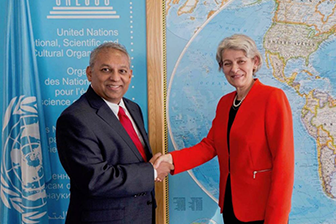The Founder and Chairman of the Presidents Board of the Diplomatic Council, H.E. Ambassador Buddhi K. Athauda, has presented his credentials to the UNESCO.
At a ceremony held on 4 October 2017 in Paris, Ambassador B. K. Atahuda presented his letter of credence to Director General Irina Bokova as Sri Lanka’s Permanent Delegate to the United Nations Education, Science and Cultural Organization (UNESCO).
During the ensuing conversation, Ambassador Atahuda outlined the steady progress accomplished by Sri Lanka in strengthening accountability, transparency, democracy and reconciliation which are also in keeping with the values advocated by UNESCO. He also reaffirmed Sri Lanka’s continued support and commitment to engage further with UNESCO in achieving peace and sustainable development.
The Director-General of UNESCO Irina Bokoa in her remarks, commended the significant contributions made by Sri Lanka to the work of the organization especially as a Member of its Executive Board. She noted with satisfaction Sri Lanka’s endeavours in fostering economic growth and reconciliation particularly through education. Further, Director-General Bokova recalled the successful visit she undertook to Sri Lanka in August 2016 where she was able to witness first-hand the progress made in different spheres.
Ambassador B. K. Athauda has previously served as Ambassador of Sri Lanka to the Netherlands and as Consul General of Sri Lanka in Frankfurt. He also has extensive experience in the private sector where he served in the senior management team of Iridium LLC, who are pioneers in mobile satellite telecommunication technologies. Ambassador Athauda is also the founder of the Diplomatic Council a United Nations (UN) registered global Think Tank with the objective to serve as a bridge between diplomacy, economy and society.
The United Nations Educational, Scientific and Cultural Organization (UNESCO) is a specialized agency of the United Nations (UN) based in Paris. Its declared purpose is to contribute to peace and security by promoting international collaboration through educational, scientific, and cultural reforms in order to increase universal respect for justice, the rule of law, and human rights along with fundamental freedom proclaimed in the United Nations Charter. It is the successor of the League of Nations’ International Committee on Intellectual Cooperation. UNESCO has 195 member states and ten associate members. Most of its field offices are “cluster” offices covering three or more countries; national and regional offices also exist.
UNESCO pursues its objectives through five major programs: education, natural sciences, social/human sciences, culture and communication/information. Projects sponsored by UNESCO include literacy, technical, and teacher-training programmes, international science programmes, the promotion of independent media and freedom of the press, regional and cultural history projects, the promotion of cultural diversity, translations of world literature, international cooperation agreements on secure the world cultural and natural heritage (World Heritage Sites) and to preserve human rights, and attempts to bridge the worldwide digital divide. It is also a member of the United Nations Development Group.
UNESCO’s aim is “to contribute to the building of peace, the eradication of poverty, sustainable development and intercultural dialogue through education, the sciences, culture, communication and information”. Other priorities of the organization include attaining quality Education For All and lifelong learning, addressing emerging social and ethical challenges, fostering cultural diversity, a culture of peace and building inclusive knowledge societies through information and communication.
The broad goals and objectives of the international community – as set out in the internationally agreed development goals, including the Millennium Development Goals (MDGs) – underpin all UNESCO strategies and activities.

